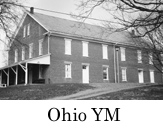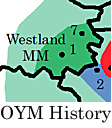Jonathan Taylor (1763-1831) was an early settler in eastern Ohio, a Friends minister, and Clerk of Ohio Yearly Meeting. He was a leader of Ohio Quakers and a man who sometimes suffered from depression - which his memorial suggests helped to deepen his attentiveness to the Lord and nurtured his ministry.
Early Years
Taylor was born in Bucks County, Pennsylvania, on the 13th of Second Month 1768. He was the son of Timothy and Letitia Taylor, who were Friends.
Taylor married his wife Ann in 1789, and they settled in Goose Creek Meeting in Loudon County, Virginia. They removed to Winchester, where they lived 1797-1800. Taylor was recorded as a minister during his time in Virginia.
Relocation to Eastern Ohio
Jonathan and Ann Taylor were among the earliest settlers in eastern Ohio, in 1800. They built a log cabin in what later became Colerain Township, Belmont County, before the land was officially opened for settlement. The Taylors' house is reported to have been the first one constructed in what later became Colerain Township. A local story states that Taylor built the cabin around a tree stump, which was to be used as a table.
When a group of North Carolina Friends settled west of the Ohio River in 1800, forming the first Quaker settlement in the Northwest Territory, they first worshipped at the Taylor cabin and continued to meet there until the first Concord Meeting House was constructed later in 1800. Taylor became a leader first at Concord (Ohio) and then at Short Creek Meeting, where he relocated in 1802.
During these early years of Quaker settlement in eastern Ohio, Jonathan Taylor was able to continue his travels in the ministry and to the Monthly Meetings and Redstone Quarterly Meeting. After the establishment of Ohio YM, Taylor served nine years as the first Clerk of the Meeting for Sufferings.
Taylor played a major role in Indian affairs. In 1818, Taylor was one of the Quaker observers who attended the signing of a treaty as an advocate of the interests of the Indians. Three years later, Taylor identified the need to open a school for Indians, which was established at Wapakoneta, Ohio (1821).
On two occasions, Taylor delivered memorials to the legislature in Ohio regarding the rights of Negroes in the state.
Clerk of Ohio YM and Later Life
Taylor was the Clerk of Ohio Yearly Meeting at the time of the 1828 division. He had been appointed to serve in 1827 and was scheduled to serve until the Representatives made a different appointment. While seated at the Clerk's table in the Mount Pleasant Meeting House on the opening day of the 1828 Yearly Meeting, a young Hicksite forced his way into the building and tried to take away the clerk's table and YM minute book; in the scuffle, the table broke. Taylor retained the minute book and the top of the table. In the meantime, another young Hicksite had forced his way through the gallery door. This man grabbed Taylor and threw him through the door and onto the ground outside the meeting house, breaking his glasses. As some Friends helped Taylor up, he is reported to have remarked, "What kind of religion is this?" Taylor went to a nearby doctor's house; the doctor placed leeches on his arms and bled him, then sent him to bed.
Taylor was the only man to serve just one year as Clerk of Ohio Yearly Meeting. He chose not to be re-appointed in 1828 after the incident during the opening session.
In Sixth Month 1830, Taylor shared a concern on his mind to visit Friends in England and Ireland. The meeting was a little uneasy to hear of this concern, as Taylor's health had suffered after Yearly Meeting in 1828. After receiving endorsements by Short Creek Quarterly Meeting and Ohio Yearly Meeting of Ministers and Elders, Taylor departed for England, accompanied by Stephen Grellet, John Wilbur and Christopher Healey. Taylor travelled in western England, Scotland, and Ireland. He became ill in Ireland, where he died on Eleventh Month 6th, 1831.
The memorial prepared to record some of his life included the following words:
"In his public communications, he was mild and persuasive, and often extensively drawn into the doctrines of the gospel... In Meetings of Discipline, he was not hasty in delivering his sentiments; but he possessed a clear judgment, and great weight and influence; but that influence never seemed to lift him up, but on the contrary to render him more condescending and even retiring."
Sources: EAQG 4:62, 287. |






